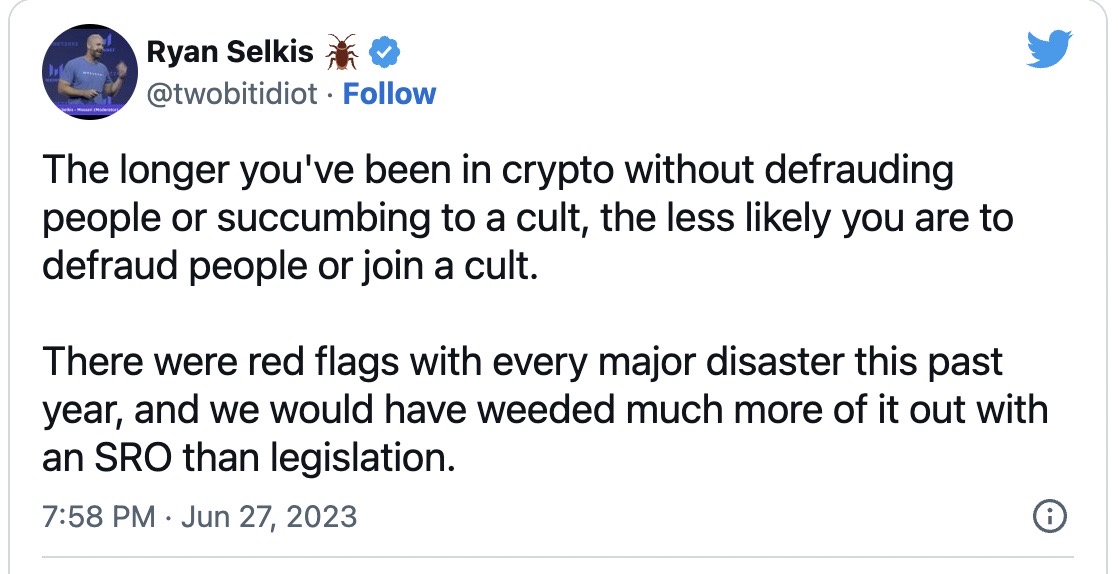Uncracking the scrambled egg
If you read this newsletter, you’re almost certainly aware of how Prometheum, a previously low-profile Securities and Exchange Commission-licensed exchange and special purpose broker-dealer, has become a punching bag for the crypto industry.
The Prometheum debate has been thoroughly canvassed
elsewhere, including on the
now-infamous episode of Laura Shin’s
Unchained podcast last week, where the company’s CEO Aaron Kaplan duelled with venture capitalist firm Paradigm’s special counsel Rodrigo Seira. Laura did a
follow-up, also.
Suffice to say that Democrats in Congress
have wheeled out Kaplan to back up the SEC’s assertion that federal securities laws work just fine for registering crypto businesses, thank you very much.
The crypto industry has countered that, Well, actually, Prometheum doesn’t have a viable business model and is the poster child for why crypto needs its own tailored rules. Also, who are you
calling scofflaws, Kaplan?
More fundamentally, though, the Prometheum story is about crypto confronting the uncomfortable reality that, like it or not, its future is going to increasingly resemble traditional market structure.
For crypto die-hards, that’s a bitter pill. Fast, peer-to-peer transactions on the blockchain were supposed to disrupt the networks of brokerages, agents, and custodians, the endless fees, the lack of transparency and the 48-hour settlement timelines that make up securities markets.
Instead, crypto is being slowly and painfully absorbed into that structure.
The problem is that market structure is designed to be a complex, mediated system. Sure, it’s expensive, inefficient, and obscure. But it does mitigate the inherent conflicts of interest and information asymmetries that occur when exchanges are also brokers, market-makers, and custodians.
Crypto exchanges commingle these functions because they can, and they have made a ton of money doing it. FTX used client money to fund its activities. Binance US allegedly artificially pumped volumes on its platform using its own market maker. Singapore’s
Crypto.com reportedly has internal teams that trade for profit on its own platform.
Just last week, Nevada regulators placed Prime Trust into receivership. The custodian owed customers $85 million, having used their money to buy crypto to satisfy withdrawals.
 My colleague, DL News’ markets correspondent Adam McCarthy, has been doing some reporting on this issue lately. He spoke to m
My colleague, DL News’ markets correspondent Adam McCarthy, has been doing some reporting on this issue lately. He spoke to market structure and financial regulation expert Sean Tuffy, who said that “Ultimately, if crypto is to survive it’s going to end up looking a lot more like TradFi.
“There’s a segregation of duties and exchanges are exchanges, custodians are custodians, everyone does [know your customer checks], and client money rules apply.”
The shift is being driven by lawsuits like the SEC’s one against Binance, by regulation like the EU’s Markets in Crypto-Assets that forces exchanges to separate out functions like trading and custody, and by heavily regulated TradFi firms like BlackRock and Fidelity
muscling into crypto.
Prometheum may or may not have built a business. But it has recognised that future exchanges will no longer be able to get away with combining businesses. And there are other crypto businesses that have got SEC licences and unlike Prometheum are already up and running. Securitize, an SEC-registered transfer agent, is one example. There will be more.
Kaplan said on
Unchained that it’s difficult for exchanges to unwind these functions as it requires rebuilding their entire tech stack and compliance architecture.
“In some sense, it’s uncracking a scrambled egg,” he said.
I suspect we’ll soon see exchanges quietly unspooling their business functions and separating out retail and institutional platforms. The winners will be the businesses that uncrack the egg or didn't scramble it in the first place.
READ MORE: Deutsche Bank, Citadel Securities signal the crypto land grab is accelerating
Oh Hello, SRO
Crypto SRO, or self-regulatory organisation, discourse
returned to Twitter this week. The notion that establishing a crypto SRO would solve the thorny issue of regulating the industry has been knocking about Washington for years, and resurfaces every now and then in
papers,
legislation,
Congressional testimony, and of course social media.

So why hasn’t a crypto SRO emerged yet?
Wait, what is an SRO? SROs are essentially membership organisations authorised under a regulatory agency that can make and enforce rules for their specific industry.
The Securities and Exchange Commission, for example, delegates much of the regulation of Wall Street brokerages to the Financial Industry Regulatory Authority.
So how would a crypto SRO work? People who advance the crypto SRO idea say that post-FTX, crypto can no longer go unregulated. But Congress hasn’t produced any laws yet, and regulators are engaged in a turf war.
Instead of trying to resolve the intractable problem of whether or not cryptocurrencies are securities, the SEC and Commodity Futures Trading Commission could co-create a new SRO that would develop and enforce the rules for the industry. Plus, the industry would pay for it.
It sounds like a great idea. Maybe it is. But it’s also a non-starter. I’ve spoken to DC insiders who have promoted this idea or been involved in trying to set up a crypto SRO, and they say the political will isn’t there.
Democrats in general think the industry is too dangerous to be allowed to regulate itself. And for many Republicans, the party of small government, creating more SROs just means creating more agencies.
READ MORE: Washington mulled letting crypto exchanges regulate themselves. That idea is dying